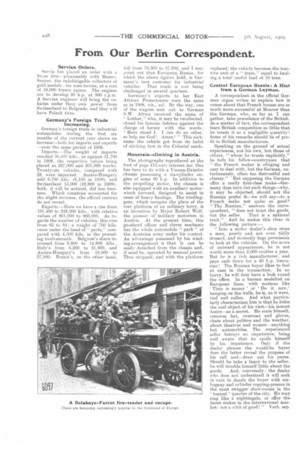From Our Berlin Correspondent.
Page 6

If you've noticed an error in this article please click here to report it so we can fix it.
Servian Orders.
Servia has placed an order with a Swiss firm—presumably with Messrs. Saurer, the indefatigable collectors of gold medals—for nine lorries, at a cost of 18,000 francs apiece. The engines are to develop 30 h.p. at 900 r.p.m. A .c...,lervian engineer will bring the vehicles under their own power from Switzerland to Belgrade, and they will have Polack tires.
Germany's Foreign Trade Increasing.
German's foreign trade in industrial automobiles during the first six months of the current year shows an increase—both for imports and exports —over the same period of 1908. Imports.—The weight of imports reached 56,400 kilo., as against 51,700 in 1908, the respective values being placed at 237,000 and 207,000 marks. Twenty-six vehicles, compared with 23, were imported. Austro-Hungary sold 6,700 kilo. (8,100 in 1908), and Switzerland 15,000 (18,800 in 1908): both, it will he noticed, did less business. Which countries accounted for the slight increase, the official returns do not reveal.
Exports.—Here we have a rise from 191,400 to 248,300 kilo_ with relative values of 861,000 to 966,000. As regards the number of vehicles, this rose from 62 to 84; a weight of 700 kilo. came under the head of '• parts," compared with 4.500 kilo. in the preceding twelvemonth. Belgium's share increased from 8,800 to 14,800 kilo., Italy's from 6,200 to 21,900, and Austro-Hungary's from 19,900 to 27,900. Russia's, on the other hand,
fell from 79,300 to 67,200, and I niay point out that European Russia, for which the above figures hold, is Germany's hest customer for industrial vehicles. That trade is now being challenged in several quarters.
Germany's exports to her East African Protectorate were the same as in 1908, viz., nil. By the way, one of the wagons sent out to German S.W. Africa received the name of ‘• Luther," who, it may be recollected, closed his famous defence against the charge of heresy with the words: Here stand I. I can do no other, so help me God! Amen ! " This nickname the vehicle got from its habit of sticking fast in the Colonial sands.
Mountain-climbing in Austria.
The photographs reproduced at the foot of page 415 ante interest me. One has here to do with a Vienna-Daimler chassis possessing a six-cylinder engine of some 80 h.p. In addition to the propelling motor, the chassis is also equipped with an auxiliary motorwinch forward, designed to assist in cases of heavy haulage. The windinggear, which occupies the place of the rear platform of an ordinary lorry, is an invention by Major Robert Wolf, the pioneer of military motorism in Austria. At the present time, this go-ahead officer and clever mechanic has the whole automobile " park " of the Austrian army under his control. An advantage pos.se,ssed by his winding-arrangement is that it can be easily detached from the chassis and, if need be, operated by manual power. Thus stripped, and with the platform
replaced, the vehicle becomes the tractive unit of a "train," equal to hauling a total useful load of 10 tons.
Central European Russia: A Hint from a German Layman.
A correspondent in the official German organ writes to explain how it comes about that French houses are so much more successful at Moscow than the German, who, so far as I can gather, take precedence of the British. As a matter of fact, the correspondent fears British competition so little that he treats it as a negligible quantity! Some of his remarks should be of profit to British manufacturers.
Speaking on the ground of actual experiences, not his own, but those of others, " whom he trusts implicitly," he tells his fellow-countrymen that "the French maker is obliging and easy to deal with, but the German, unfortunately, often too distrustful and clumsy." But supposing the German offer a really first-class make—Germany does turn Out such things—why, it may be objected, should not the Russian prefer it—we will say—to a French make not quite so good ? " The Russian," answers the correspondent, " does not trust the. goods, but the seller. That is a national trait." And he makes this clear in the following picture: " Into a motor dealer's shop steps a man, poorly and not even tidily dressed, and modestly begs permission to look at the vehicles. On the score of outward appearances, he is not worth more than 2,000 roubles a year. But he is a rich manufacturer, and pays cash down for a 40 h.p. limousine! The Russian buyer likes to feel at ease in the transaction. In no hurry, he will first have a look round the office. In a bureau modelled on European lines, with mottoes like ' Time is money' or ` Do it now,' hanging on the walls, he is, as it were, tied and sullen. And what particularly characterizes him is that he hides the real object of his visit—his inmost desire—as a secret. He seats himself, removes hat, overcoat and gloves, chats about polities and the weather, about theatres and women—anything hut automobiles. The experienced seller betrays no impatience, being well aware that he spoils himself by his impatience. Only if the dealer pleases the would-be buyer does the latter reveal the purpose of his call and—draw out his purse. Should he take a fancy to the seller, he will trouble himself little about the goods. And, conversely: the dealer who does not understand it will seek in vain to dazzle the buyer with mahogany and cylinder copying-presses in the most swagger show-rooms in the toniest ' quarter of the city. He may sing like a nightingale, or offer the finest makes in the international market: not a whit, of good ! " Verb. sap.




















